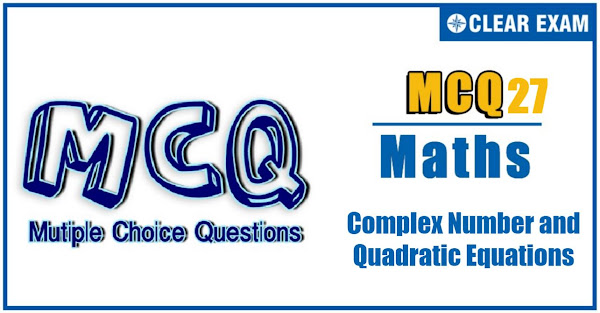Complex numbers and quadratic equations is a segment of maths that deals
with crucial theorems and concepts along with various formulae. It
comprises of linear and quadratic equations along with roots related to
the complex number's set (known as complex roots)..
Q1.
Statement 1: If z1,z2 are the roots of the
quadratic equation az2+bz+c=0 such that Im
(z1z2)≠0, then at least one of a,b,c is
imaginary
Statement 2: If quadratic equation having real coefficients has complex roots, then roots are always conjugate to each other
Statement 2: If quadratic equation having real coefficients has complex roots, then roots are always conjugate to each other
Q2. Statement 1: If the equation
ax2+bx+c=0,0<a<b<c, has non-real complex roots
z1 and z2, then
|z1|>1,|z2|>1
Statement 2: Complex roots always occur in conjugate pairs
Statement 2: Complex roots always occur in conjugate pairs
Q3. Statement 1: equation ix2+(i-1)x-(1/2)-i=0 has
imaginary roots
Statement 2: If a=i,b=i-1 and c=-(1/2)-i, then b2-4ac<0
Statement 2: If a=i,b=i-1 and c=-(1/2)-i, then b2-4ac<0
Q4. Statement 1: The question –x2+x-1=sin4x has only one solution.
Statement 2: If the curve y=f(x)and y=g(x) cut at one point, the number of solutions is 1.
Q5. Statement 1: If a,b,c,a1,b1,c1
are rational and equations ax2+2bx+c=0 and
a1x2+2b1 x+c1=0 have
one and only one root in common, then both b2-ac and
b12-a1c1 must be
perfect squares
Statement 2: If two quadratic equations with rational coefficient have a common irrational root p+√q, then both roots will be common
Statement 2: If two quadratic equations with rational coefficient have a common irrational root p+√q, then both roots will be common
Q6. Statement 1: If a+b+c=0 and a,b,c are rational, then the roots of
the equation (b+c-a) x2+(c+a-b)x+(a+b-c)=0 are
rational.
Statement 2: Discriminant of equation (b+c-a) x2+(c+a-b)x+(a+b-c)=0 is a perfect square.
Statement 2: Discriminant of equation (b+c-a) x2+(c+a-b)x+(a+b-c)=0 is a perfect square.
Q7. Let a,b,c,p,q be real numbers. Suppose α,β are the roots of the
equation x2+2px+q=0 and α,1/β are the roots of the
equation x2+2bx+c=0, where β2∉(-1,0,1)
Statement 1: (p2-q)(b2-ac)≥0
Statement 2: b≠pa or c≠qa
Statement 1: (p2-q)(b2-ac)≥0
Statement 2: b≠pa or c≠qa
Q8. Statement 1: If (a2-4)
x2+(a2-3a+2)x+(a2-7a+10)=0 is an
identity, then the value of a is 2
Statement 2: If a-b=0, then ax2+bx+c=0 is an identity
Statement 2: If a-b=0, then ax2+bx+c=0 is an identity
Q9.
Statement 1: If | z1+z2
|2=|z1 |2+|z2
|2,then z1/z2 is purely
imaginary
Statement 2: If z is purely imaginary, then z+z ̅=0
Statement 2: If z is purely imaginary, then z+z ̅=0
Q10. Let f(x)=-x2+(a+1)x+5
Statement 1: f(x) is positive for some α<x<β and for all a∈R
Statement 2: f(x) is positive for all x∈R and for some real a
Statement 1: f(x) is positive for some α<x<β and for all a∈R
Statement 2: f(x) is positive for all x∈R and for some real a















